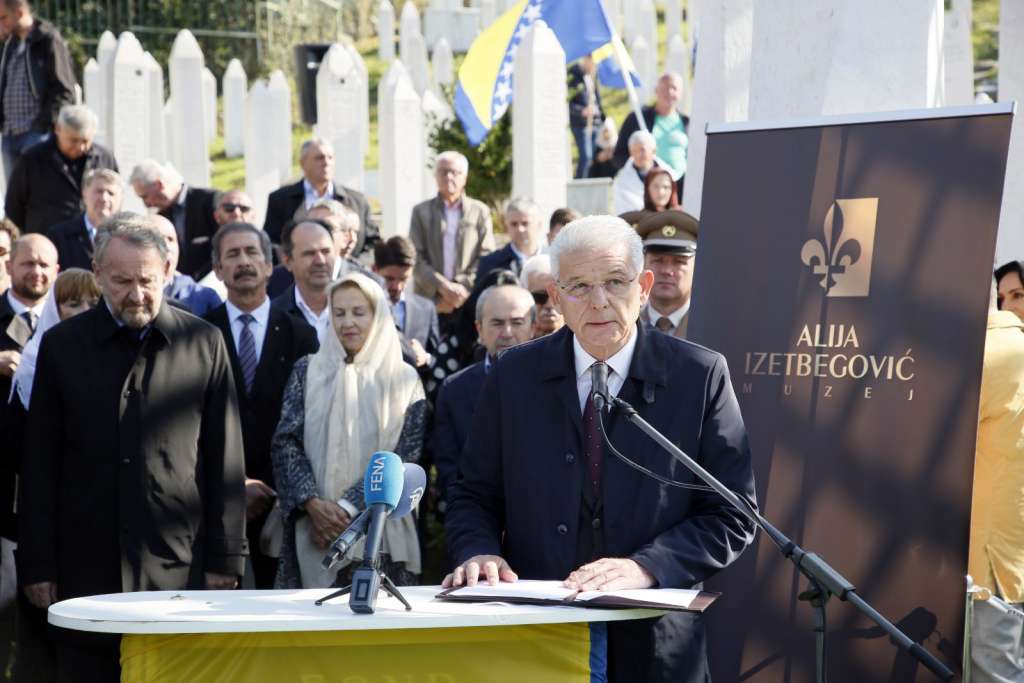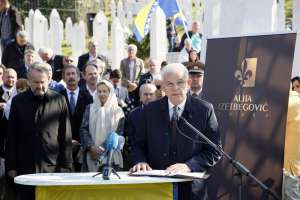SARAJEVO, October 19 (FENA) - The 19th anniversary of the death of Alija Izetbegović, the first Chairmn of the Presidency of the Republic of Bosnia and Herzegovina, was marked today at the Kovači Shaheed's Cemetery in Sarajevo by laying flowers and reciting the Quranic surah Al-Fatiha.
Flowers were laid by numerous delegations from the state, federal and lower levels of government in Bosnia and Herzegovina, representatives of the diplomatic corps, veterans' associations, members of the Democratic Action Party (SDA) and others.
The Chairman of the Presidency of Bosnia and Herzegovina, Šefik Džaferović, said on this occasion that "the name of Alija Izetbegović evokes an inexhaustible number of topics because he is a peculiar person and one of the most important people in the history of this country."
The address follows below in its entirety:
Ladies and gentlemen, dear friends,
I feel honored and proud to have known the late Alija Izetbegović. I feel honored and proud to have been his associate. Because I was and remain his follower.
I feel an exceptional moral duty and social privilege, that today, in the capacity of Chairman of the Presidency of Bosnia and Herzegovina, in this place, I speak about Alija Izetbegović.
Dear friends,
Alija Izetbegović's name evokes an inexhaustible number of topics because he is a peculiar personality and one of the most significant people in the history of this country. Certainly the most significant person in the recent history of Bosnia and Herzegovina.
Alija Izetbegović's name evokes an inexhaustible number of topics, but today I will talk about three.
About his character.
About his fight for the state of Bosnia and Herzegovina.
About his fight for the Bosniak people.
First, about character. I knew the late Chairman Izetbegović personally and I cannot but be personal when I talk about him. As a young man, I was his associate. I had the opportunity to talk with him day after day, and closely observe his actions and his attitude toward people.
What I knew about Alija Izetbegović as a Bosniak and an ordinary citizen, I further confirmed by working with him.
Alija Izetbegović was a president, thinker, writer, humanist, lawyer.
However, one word best summarizes the impressions we all felt in front of the person of the late president.
Alija Izetbegović was a STATESMAN. In the true sense of the word.
Although he was also a politician, Alija Izetbegović is not remembered as a politician, but as a statesman.
Politicians dream of power. Statesmen watch over the fate of the country and people.
Politicians only think about the next elections. Statesmen think about future generations.
For politicians, power is the goal. For statesmen, it is only a tool.
Alija Izetbegović was a statesman. Because power for him was a means to do something good. Because he watched over the fate of Bosnia and Herzegovina and the Bosniak people. Because he was thinking about the generations to come.
Alija Izetbegović was a statesman because he was a man of thought, but also of action. There are politicians who think a lot but do not act. There are also those who act a lot but without much thought. Alija Izetbegović was a statesman because he thought and acted.
Dear friends,
Now I will say something more about the second and third topic - about the fight of President Izetbegović for the state and the Bosniak people.
He was a statesman because he shared the fate of Bosnia and Herzegovina and his people.
He was 65 years old when he was elected Chairman of the Presidency of Bosnia and Herzegovina.
He remembered the division of Bosnia and Herzegovina, through the Cvetković-Maček agreement.
He survived the Second World War, which Bosniaks faced without their own state. He remembered the crimes against Bosniaks and the attempts to assimilate us.
He fought on the side of the Partisans, although he was not a communist, like many other Bosniaks.
He truly believed that Bosnia and Herzegovina belonged to all its peoples. That's why he protested when the new authorities betrayed the ZAVNOBiH formula and pushed aside the Bosniaks, who were then named after their religion.
He always emphasized that this country belongs to all its nations and people. He emphasized that everyone has the right to love her, even when they didn't.
He knew that Bosniaks, due to their historical destiny, are tied to the destiny of Bosnia and Herzegovina by an umbilical cord. But he never, I repeat - he never denied Serbs and Croats the right to feel Bosnia and Herzegovina as their own.
He fought so that no one would be uncomfortable in this country and in his own skin.
Convinced that different peoples can and should live together, he fought for different opinions to be confronted in public. He was a staunch democrat to the end. He said that the right of the stronger is not a right, but a fact. He said that true law was created to protect the weak. He said that freedom of thought is primarily the freedom to think differently.
And then a paradox happened. He who fought for coexistence was accused of doing the opposite. He who fought for the freedom of thought was accused of doing the opposite.
He was convicted twice, for words and thoughts. The first time as a young man, and the second time as a mature man. Both times he preserved his dignity, knowing that there are times when a free man has no choice but to be a prisoner.
The people understood that, after the Sarajevo Process, despite the regime's intentions, the process turned into its opposite. The intention was to convince the Bosniak people not to follow Alija Izetbegović. And the opposite happened.
The people always followed Alija Izetbegović. Even during communism. As a manager of large construction sites, he led projects on which half a thousand workers worked. It is known how much influence his articles in Preporod had on Bosniak intellectuals and the ulama of that time.
When he came to power, there was no revanchism. Even some of his interrogators testified about this. He knew that the motive of his persecutors was to divide the people and therefore he did not want to follow their path.
He followed another path. His thought, which was formed primarily on the Holy Qur'an, and then on the highest achievements of Western philosophy, refined by folk wisdom and experience, was a light and a guide for the Bosniak people, which will be going through the most turbulent period in modern history.
Dear friends,
As I said, Alija Izetbegović was 65 years old when he became the president of independent Bosnia and Herzegovina.
Up to that point, he had lived through almost everything a man can live through in his lifetime. But in the next ten years, he lived through even more.
Independence and international recognition of Bosnia and Herzegovina.
The siege of Sarajevo and genocide throughout Bosnia and Herzegovina.
The double aggression. The weapons embargo.
The creation and strengthening of the Army of the Republic of Bosnia and Herzegovina.
Various peace negotiations.
The solidarity of friends in the world, and the cynicism of those who were not.
Liberation actions of the RBiH Army.
July 11, which he said was the biggest catastrophe that could happen in our lives.
The intervention of the international community.
And finally – the Dayton Peace Agreement.
Throughout the entire period of aggression, and especially at the very beginning and end, he bore the greatest burden of responsibility. Alija was always up to the task. He always questioned his views, listened to others, consulted others, but defended what he believed in with great strength. We should never forget that this is a man who paid for his beliefs with his freedom.
Explaining the responsibility of statesmen, he once said: "History is not a laboratory so you can try out several possibilities and monitor the results." You can only do what you're about to do once."
The decision to start gaining independence has passed the test of history.
Acceptance of the Dayton Peace Agreement passed the test of history.
Both of these decisions were historically correct and necessary. The violent destruction of Yugoslavia was not the will of Alija Izetbegović, but the will of others. And the will of others is an objective circumstance. After becoming the head of a country that was attacked from outside and inside, he made the best decision - Bosnia and Herzegovina started the path of independence.
The ultimate goal of the aggressors was to overturn this decision. Alija Izetbegović never agreed to it. From the Carrington and Cutilier plans, through the Vance-Owen and Owen-Stoltenberg plans, until the Dayton Agreement, he never agreed to nullify the independence and integrity of Bosnia and Herzegovina.
He did not consider the Dayton Peace fair, but he considered it more fair than the continuation of the war. In the world as it is, with power relations as they are, a better peace could not be achieved. Our problem was not that we accepted the American peace initiative, but that it did not happen earlier and that it was not fairer. With the imposed embargo, the cynicism of the world and the double aggression of our neighbors, we did not have enough strength for a complete victory. But we didn't even lose. We got a chance to win in peace, which we did by strengthening and building state institutions.
Dear friends,
The strategy of the anti-state forces, after reluctantly accepting the Dayton Peace, was to tire us and the world. But they tired themselves. First, because we, with the support of our friends, were stronger. Second, because the destruction of Bosnia and Herzegovina is not in the interest of any nation.
Not shying away from telling hard truths, the late president once said that Bosnia and Herzegovina is what the Bosniak people want most at this moment. But he added that it should not be imagined without the Serb and Croat people. The same as without other peoples, who have been living here for centuries.
On another occasion, the late president said that the solution to all our problems is a complete and democratic Bosnia and Herzegovina. "Comprehensive" - means to reduce ethnic divisions, and "democratic" - to develop a division of opinion within each nation, instead of between them.
Dear friends,
I was recently in the Czech Republic, at the summit of the European Political Community. Our people, who live in the Czech Republic, reminded me of one detail, which I will finish with.
What Alija Izetbegović is for us, Vaclav Havel is for the Czechs.
A month before the signing of the Dayton Agreement, Vaclav Havel gave unconditional support to the legal authorities and the Army of the Republic of Bosnia and Herzegovina, comparing the fate of our country with that of Czechoslovakia in 1938 and strongly condemning attempts to equalize the parties in Bosnia and Herzegovina.
Asked what he thought about Alija Izetbegović's political views, Havel said that he hardly saw any difference between his and Izetbegović's views, adding that in his conversations with him he became convinced that the Bosnian side wants democracy, civil coexistence of different peoples and religions, which is the cornerstone of modern civilization.
I heard an almost identical assessment of the late president from numerous other statesmen in all parts of the world.
Alija Izetbegović, his thought, as well as the fate of Bosnia and Herzegovina, were one of the rare issues on which both West and East agreed, and that is no small matter.
Let us be aware of it forever.
Let's be grateful to God for the country and the freedom we have, and work hard to make our situation better.
Let us be forever proud that we had Alija Izetbegović and that we follow his path.
Thank you for your attention!
(FENA) L. N.











